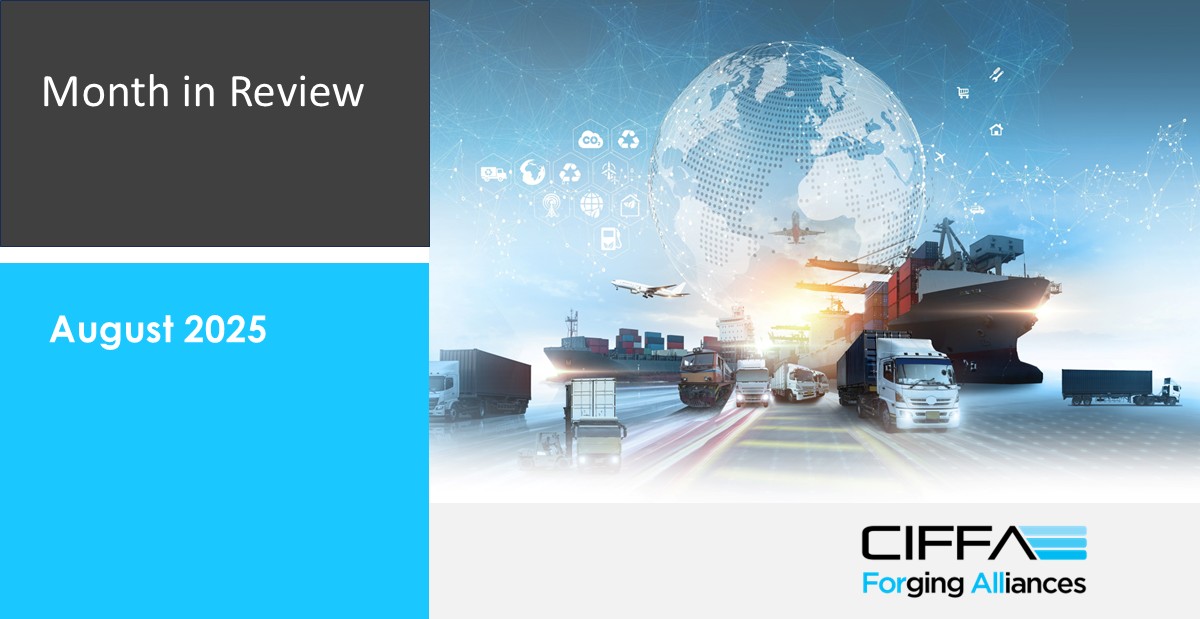
Month in Review – May 2025
Maritime
May 1: Congestion and Rising Costs at Europe’s Box Ports Forecast to Last into Summer – The Loadstar
Major congestion across north European ports is forecast to last well into the summer, with this week’s strikes at Antwerp-Bruges not having helped the situation.
Before the start of industrial action on April 29, yard utilization at Antwerp had already hit 96%, with reefer plugs reportedly over capacity at 112%. More than 100 vessels were awaiting service after the strike concluded on the morning of April 30.
This latest strike is not the sole cause of the difficulties being felt in Northern Europe.
Maersk began to issue advisories in mid-April that operators were contending with “increasing congestion levels and operational disruptions at several ports,” pointing to low inland water levels, amendments to ocean networks, and a drop in available labour.
Added to which, said a spokesperson for the Belgian gateway: “Schedule reliability and large calls-sizes also are an issue.”
May 2: Progress in the Salvage Operation for MSC Baltic III – The Maritime Executive
The Canadian Coast Guard is reporting progress with the salvage operations for the grounded containership MSC Baltic III, which has been stranded in a remote part of Newfoundland since losing power on February 15. Weather, despite it having progressed from winter to spring, continues to be the biggest challenge with the cove exposed where the vessel is grounded and days when crews cannot access the ship.
Fuel removal from the wreck is a slow process, as it requires heating before the fuel is pumped from the vessel’s tanks to frac tanks on deck. When full, the tanks are too heavy to lift, so the fuel needs to be again heated and pumped to tanks on a barge alongside.
Images on Canadian TV showed the vessel’s cranes in operation shifting containers. The Coast Guard reports an additional 14 boxes had been transferred to a barge and moved by tug into Corner Brook. Previously they reported eight boxes with hazardous polymer beads were removed. The vessel had approximately 470 boxes aboard, although half were reported to be empty.
There is no estimate of how long it will take to complete the salvage operation. The contractors hired by MSC have begun work on an access road into the area of the cove. It will be used to move personnel and equipment into the area. Earlier reports had said a bridge would be built to the bow of the vessel to also provide easier access and make the operations less dependent on good weather conditions.
May 9: Hapag-Lloyd Won’t Take Bookings if Port Congestion Leaves Cargo Stranded – The Loadstar
A “cautious” Hapag-Lloyd has warned it will not accept bookings if port congestion leaves cargo “stranded” at transshipment hubs, leaving Canadian forwarders struggling to secure space to the Middle East.
In a briefing last week by Hapag-Lloyd and Port Saint John, one forwarder said, “Many in Canada are experiencing challenges securing space to key Middle East destinations until late June to early July.” And the forwarder asked: “What concrete steps are being taken to increase routing options and booking availability to improve access for Canadian exporters?”
“There are some congestion issues at some of the major ports in Europe, including Tangier, Rotterdam, Antwerp – and this congestion is real,” said Hapag-Lloyd’s director of sales Canada, Matt Montanaro. “The reality is that we took the stance that we will not accept bookings if we know your cargo will be stranded at a transshipment port.
“We prefer being up front… giving you the option to book should there be options elsewhere versus taking the booking and then having that box stranded at a terminal, and for which we cannot give you an ETA to final destination,” added Mr. Montanaro.
A spokesperson for Hapag-Lloyd said: “This is a policy specifically for Canada and just to Middle East destinations, so it is not a global policy.” But, he said, Hapag-Lloyd could see the situation “slightly improving” after “at least another month or so.”
May 12: Service Chaos from Trade Ban with India a Problem for Pakistan Shippers – The Loadstar
Pakistan’s main container gateways of Karachi and Port Qasim are reportedly facing serious congestion after mainline carriers halted direct calls there in the wake of the trade ban with India.
The disruption followed a May 2 order by New Delhi, preventing carriers from moving Pakistan-origin cargo through Indian ports.
According to multiple industry sources, the sudden ‘tit for tat’ embargo created chaos, with little time for ocean carriers to plan alternatives, leaving Pakistan exports stranded and boxes dropped off at other Asian transshipment ports, particularly Sri Lanka’s Colombo.
There has been a large pileup of boxes on the dock, available reports from Pakistan suggest.
May 14: South African Port Union Votes to Authorize Strike – The Maritime Executive
The main labour union for South African ports operator Transnet is preparing to go out on strike by the end of the week if last-ditch wage negotiations fail.
The United National Transport Union (UNTU) is in talks with Transnet for renewal of its labour contract, which covers more than 26,000 employees. Transnet has offered a raise of six percent per year for the next three years, but UNTU is seeking a raise of 10 percent in the first year.
On May 14, the union’s membership voted overwhelmingly in favour of a strike if last-minute arbitrated talks do not succeed. The negotiations were set to run through May 15, at which point the UNTU could stage a walkout and paralyze the nation’s main seaports.
May 16: World’s First Successful eBL Transaction Announced – Splash
The Digital Container Shipping Association (DCSA) has announced the world’s first successful interoperable electronic bill of lading (eBL) transaction, marking a major step toward digitizing global trade.
Until now, eBL adoption has been limited by fragmented platforms requiring all parties to use the same provider. Using DCSA’s interoperability framework, this breakthrough enables real-time document exchange across different platforms, overcoming a key barrier to widespread adoption.
The achievement promises major efficiency gains, with McKinsey estimating $6.5 billion in cost savings and $40 billion in increased trade. More interoperable eBL transactions are planned with major carriers and shippers in the coming months.
May 21: New Study Sheds Light on Urgent Workforce Gaps in Canada’s Marine Sector – Imagine Marine
The Canadian Marine Careers Foundation (CMCF) has announced the release of the Canadian Seafarers Pathway Study, a first of its kind comprehensive report revealing critical labour and skills shortages in the country’s marine transportation sector. The study identifies a pressing need to attract and train new talent, with domestic vessel operators needing to hire 8,300 new workers to meet industry demand and replace retirees by 2029 – the equivalent of more than 30% of its current workforce.
Without significant changes, Canada’s marine training system will not be able to meet labour demands, and the study provides a roadmap of evidence-based recommendations designed to help guide the CMCF and the sector in developing and implementing strategies to ensure the marine sector’s future viability.
The study provides national and regional analysis of workforce trends, recruitment and retention challenges, and examines the capacity of marine training institutions to meet future labour requirements. The study focuses on marine occupations onboard Canada’s domestic commercial and public-sector vessels, such as cargo ships, ferries, tugs and barges, tourism-related boats and Canadian Coast Guard vessels, but also occupations onshore that support vessel operations. It does not include port and terminal operations.
May 27: New Services and Reinstated Blanked Sailings Boost Transpacific Capacity – The Loadstar
The Gemini Cooperation has introduced an additional transpacific service as a rush of demand and rising rates tempt carriers to bolster east-west capacity.
Maersk and Hapag-Lloyd have announced the new TP9/WC6 service, covering East China and North-east Asia to Long Beach, adding to Gemini’s existing transpacific service portfolio. Its rotation of Xiamen-Busan-Long Beach-Xiamen will connect the ports in China and South Korea with the U.S. west coast in 18 and 14 days, respectively.
May 29: Houthis Claim Red Sea Safe for Box Ships Not Calling at Port of Haifa – The Loadstar
Spokespersons for the Yemeni-based Houthi militia have said they will no longer target commercial vessels transiting the Red Sea.
Last week, the group said they would target vessels entering Israel’s port of Haifa, but their statement was ambiguous on what this meant for ships using a waterway under threat of attack for the better part of 18 months.
But on May 28, the group confirmed: “Ships transiting the Red Sea without stopping at port of Haifa will not be targeted.”
Air
May 30: Air Traffic Control Shortages Seen at U.S. Facilities Nationwide: FAA Data – NewsNation
The U.S. Federal Aviation Administration is short about 3,000 air traffic controllers nationwide, increasing pressure on airports, flights, workers and passengers.
According to FAA data, Denver is short 47 air traffic controllers, Jacksonville, Florida, is short 31 and northern California is short 34.
Overall, agency records show nearly half of the FAA’s air traffic facilities are below target staffing levels. However, the staffing issues are not evenly distributed. Some have double-digit disparities, but most are missing five workers or fewer.
On May 28, Transportation Secretary Sean Duffy said safety is the agency’s “top priority.” If staffing is too low, he said the FAA reduces flight traffic and clears fewer planes for takeoff or landing in a given airspace.
But that means more ground stops, more passengers waiting and more burnout for the controllers on duty.
Rail
May 15: Supreme Court of Canada Okays CN Rail’s $250-Million Logistics Hub Project in GTA – ConnectCRE.ca
The Supreme Court of Canada has enabled CN Rail’s $250-million logistics hub project in the Greater Toronto Area to proceed.
Canada’s highest court dismissed an appeal request designed to stop the massive development in Milton, Ont., the Canadian Press reported.
The project is located next to an existing CN facility in Milton and designed to double the company’s rail capacity in the Halton region. It will house an inter-modal facility that transfers shipping containers to semi-trucks from trains in Milton.
Keeping with convention, the court did not explain its reasons for denying the appeal request. The rejection came after the Federal Court of Appeal dismissed a legal challenge intended to scrap the project.
A three-judge Federal Court of Appeal panel’s unanimous ruling found that the federal government’s decision to let CN build the terminal despite significant adverse environmental effects was reasonable.
The Halton Region, its four municipalities and the Halton Region Conservation Authority took CN and Ottawa to court in an effort to overturn the federal government’s 2021 approval of the project.
Trucking
May 2: North American Class 8 Truck Orders Plummet in April – Today’s Trucking
The impact U.S. and retaliatory tariffs are having on the North American new truck market are becoming clearer, as more fleets choose to sit on the sidelines amid the uncertainty.
Preliminary North American Class 8 orders in April fell to 7,400 units, according to FTR, the lowest monthly total since May 2020, when order activity cratered due to COVID shutdowns. The seven-year average for April is 18,963 units, FTR reported.
The industry forecaster blames uncertainties over tariffs, the economy and freight markets, which have collectively killed enthusiasm about making capital investments in new rolling stock.
May 6: B.C. Roadside Crackdown on Driver Inc. Begins May 13 in Kamloops – Today’s Trucking
A Driver Inc. crackdown in British Columbia will begin in Kamloops on May 13.
Provincial and federal agencies, including Commercial Vehicle Safety and Enforcement, Insurance Corporation of British Columbia, WorkSafeBC, and Employment and Social Development Canada (ESDC), will begin a coordinated roadside campaign, according to a B.C. Trucking Association (BCTA) news release.
The focus will be on vehicle compliance and identifying labour violations in the commercial transport sector.
This initiative builds on recent actions in Ontario, where federal and provincial agencies have worked together to audit non-compliant carriers and inform drivers of their rights.
The BCTA said that this sends a clear message in B.C. that companies operating outside the law are now under scrutiny. Authorities are increasing their presence, and enforcement teams are sharing information across jurisdictions.
Additional enforcement dates and locations will follow, BCTA said.
May 7: OTA Marks Progress in Fight Against Driver Misclassification, Labour Abuse – Today’s Trucking
The Ontario Trucking Association (OTA) says it is making headway in its fight against the misclassification of drivers, under the scheme known as Driver Inc.
Three key provincial and federal agencies – Ontario’s Ministry of Transportation (MTO), Employment and Social Development Canada (ESDC) and Ontario’s Workplace Safety and Insurance Board (WSIB) – gathered at the Whitby, Ont., inspection station in March to explore the issue and raise awareness.
In addition to inspecting trucks for their weights and safety fitness, the organizations also checked drivers to ensure their carriers are obeying labour laws. ESDC handed out information about drivers’ labour rights, while identifying companies deserving of a potential audit. WSIB also provided education about labour laws, handing out stickers containing a QR code directing drivers to further information on their rights. WSIB, too, identified potential violators that will potentially receive audits, OTA adds.
OTA and the Canadian Trucking Alliance say the initiatives build on a recent information sharing agreement between ESDC and Canada Revenue Agency, announced in March.
“Governments are taking an interest in the underground economy, road safety issues, and are concerned about tax evasion, worker abuse and crime,” said CTA and OTA president, Stephen Laskowski. “They are also sharing information and working together like never before. If companies don’t abandon this model now, after many years of education, they won’t be able to say they didn’t know about the consequences.”
May 12: New Trucking Standards to Streamline Metro Vancouver Freight – Today’s Trucking
TransLink – Vancouver’s transportation network, serving public transit, major roads and bridges – launched an initiative to streamline trucking standards across Metro Vancouver, aiming to cut costs and simplify the permitting process for commercial vehicles operating in the region.
Inconsistent rules between municipalities have long created barriers for transport trucks, often requiring separate permits and limiting access to specific routes based on local definitions of size and weight. According to a TransLink news release, the new regional standards, developed in consultation with local governments and industry partners, will align these regulations and make it easier for carriers to operate across municipal boundaries.
If fully adopted, it will standardize the definition of a heavy truck to vehicles with a gross vehicle weight over 11,793 kilograms. This change has already been adopted by roughly 98% of Metro Vancouver municipalities. Nearly half of local governments have also aligned their rules around oversized and overweight vehicles, a process that is expected to be completed within the next year.
May 12: Service Ontario’s IRP Delays Hurting Trucking Companies – Today’s Trucking
Ontario has made changes to the administration of the international registration plan (IRP), leading to backlogs and delays. The IRP is a registration reciprocity agreement among 10 Canadian provinces, the 48 contiguous U.S. states, and the District of Columbia. It allows vehicles to travel between participating provinces and states with one licence plate and registration document.
As of March 3, Service Ontario began delivering IRP services on behalf on the Ministry of Transportation (MTO).
Before the transition, applications to register new trucks or renew existing ones were handled by a local IRP office, in about three to five business days, said Bob Cousins, CEO and owner of The C & C Group of Companies.
The Ontario Trucking Association (OTA) is working with both the MTO and Service Ontario to resolve the issue quickly. Geoff Wood, OTA’s senior vice-president, policy, said that the IRP issue is hurting the industry. “We are focusing on eliminating the backlog and getting trucks and drivers moving,” he said.
May 23: Ocean Trailer Cleared of Circumventing Trade Tribunal Ruling on Chassis Imports – Today’s Trucking
A CBSA investigation into the import of Thaco container chassis from Vietnam by Ocean Trailer has determined the activity doesn’t circumvent a Canadian International Trade Tribunal (CITT) ruling.
CBSA initiated an investigation on November 25, 2024, after complaints from Max-Atlas International. The chassis manufacturer alleged Ocean Trailer was circumventing a tribunal ruling by having chassis comprised largely of Chinese parts and components assembled in Vietnam before import to Canada.
China-made container chassis are subject to an anti-dumping duty equal to 126.4%, CBSA reports.
“The complainant alleges that the goods are assembled or completed in Vietnam by means of insignificant processes, using parts or components – that represent a major portion of the total cost of producing the like goods – originating in or exported from China.”
Ocean Trailer suspended the import of the chassis while the investigation was ongoing.
CBSA investigators visited Thaco in Vietnam to verify its production of such container chassis did not circumvent the CITT ruling.
“Thaco detailed the production process, which includes the following six main steps: fabrication of steel workpieces and main beams, welding, shot blasting, electrophoretic dipping, painting, and assembly. All six of these steps are performed by Thaco and its related parties, all in Vietnam,” CBSA concluded in a preliminary ruling last month.
May 27: FMCSA Reveals English Proficiency Enforcement Standards – Trucking Dive
Starting on June 25, state and federal officials will enforce out-of-service violations for failure to comply with English-language proficiency, following several rule changes made in May.
The Federal Motor Carrier Safety Administration circulated a new enforcement policy on May 20, asking officials to begin all roadside inspections in English. If the inspector suspects the driver lacks language proficiency, the official can then subject drivers to a test. Drivers who fail the test can be cited for a violation, effective immediately. Once the North American Standard Out-of-Service Criteria is updated, inspectors will also place the driver out-of-service for non-compliance with the language standard.
The Commercial Vehicle Safety Alliance will officially add non-compliance with English-proficiency requirements to the North American Out-of-Service Criteria on June 25. Both the FMCSA and CVSA’s rule changes come as a result of an executive order from President Donald Trump, in which he called on organizations to increase enforcement of English-language proficiency in trucking.
May 27: Prince Rupert Port Plans Self-Driving Trucks, Unions ‘Dead Set’ Opposed – Canadian Underwriter
Prince Rupert’s port is testing self-driving trucks, The Tyee has learned. But unions fear job losses and safety threats.
The Prince Rupert Port Authority plans to carry out trials with the autonomous vehicles this summer and hopes to make them part of its operations.
A port authority presentation obtained by The Tyee says the technology is needed to address driver shortages as the port expands.
Christopher Monette, Teamsters Canada director of public affairs, says members are “annoyed and angered” the port authority is pursuing self-driving trucks instead of cheaper ways to address a possible driver shortage. The union represents about 30 truck drivers and six maintenance workers at the port.
And the International Longshore and Warehouse Union, or ILWU, says the plan raises safety concerns for about 700 workers it represents at the port.
May 29: Ontario Act Gives WSIB More Power to Crack Down on Driver Misclassification: OTA – Today’s Trucking
Ontario has introduced its Working for Workers Seven Act, 2025, which the Ontario Trucking Association (OTA) says signals it is increasingly serious about clamping down on employee misclassification.
The seventh rendition of the act comes with 18 new proposed measures to protect Ontario workers and the economy.
The new package looks to enhance protections against job scams and expand entitlements for workers to provide better support in the event of layoffs, the province announced this week.
The OTA noted new measures authorize the Workplace Safety and Insurance Bureau (WSIB) to penalize employers who provide false and misleading statements in connection with claims, fail to keep and produce accurate payroll records or evade WSIB premiums. The association says this will enable WSIB to crack down on the misclassification of drivers.
CIFFA Advocacy, Communications, Activities
In a letter to David McGuinty, Canada’s Minister of Public Safety, CIFFA has strongly urged the Government of Canada to consider further delaying the CARM implementation date until all parties are confident that trade will proceed with minimal disruption. CIFFA also requested excluding U.S. tariffs from security calculations given the current uncertainty and unpredictability of trade within CUSMA.
In addition to these urgent concerns, CIFFA proposed a longer-term reform to Canadian customs practices: permit the release of imported goods valued under $5,000 without the necessity of posting a customs bond.
May 26: CIFFA Writes to CBSA with Request for Clarification and Reconsideration of New Surety Bond Acceptance Requirement in CARM
Bruce Rodgers, Executive Director of CIFFA, sent an email to the CBSA’s Kerri-Anne Whittaker, Director, CARM Business Relationship Management. Bruce wrote:
“I am writing to seek clarification regarding the recent change implemented on May 20th, 2025, in the CARM Client Portal concerning the acceptance process for commercial surety bonds.
Prior to this date, when a surety bond was submitted via the API by a surety company, the system automatically recorded and accepted the bond on behalf of the importer. This allowed for a streamlined process that reduced administrative burden and minimized the risk of delays in release prior to payment (RPP) privileges.
As of May 20th, the process changed whereas importers are now required to manually log in to the CARM Client Portal and explicitly accept the bond for it to be activated. While we recognize the importance of accountability and visibility in financial security management, this new step introduces added complexity and disruption to import operations—particularly for importers who are unaware of this change or are not regularly monitoring the portal.
When an API bond is submitted, it should automatically trigger enrollment within the system, removing the need for importers to manually log in and activate it. This was the original intent of the API functionality, and customs brokers were strongly encouraged to rely on automation rather than intervene manually. As a result, brokers are now scrambling to support importers who are either unaware of this new requirement or unsure how to complete the manual steps. The outcome has been increased workload, confusion and shipment delays, despite the availability—and intended use—of automation to streamline this process.
We respectfully urge the CBSA to reconsider and revert to the previous process, where bonds submitted via API were automatically accepted on behalf of the importer. That approach ensured timely activation, reduced friction, and supported a more efficient and reliable financial security process for all stakeholders.
We appreciate your continued efforts to modernize and improve the customs process and look forward to your response on this matter.”



